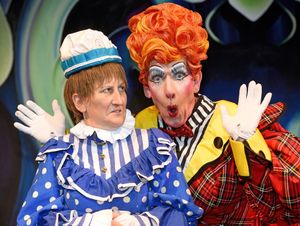Oh yes it is... Oh no it’s not: Region's pantos fall victim to Covid-19 crisis
They might appear like nothing more than fun.

Some might imagine that pantomime is the lowest form of entertainment. Yet in the life cycle of our local theatres, panotmimes are deadly serious. No show is more important. They are the lifeblood of arts across our region.
Take Theatre Severn, in Shrewsbury – though we’ll come onto Black Country theatres and larger, regional theatres in Birmingham soon. Theatre Severn is an impeccably run theatre. Its programmer, David Jack, is among the best in the UK and he is ably supported by an exceptional technical team, marketing unit and others in different sectors.
Each year, Jack programmes an annual pantomime. Last year’s sold 42,500 tickets as people of all ages filled the seats for 71 performances. That means each show – including the mid-week matinees – attracted just shy of 600 in an auditorium that seats 638. The show, therefore, enjoyed a 94 per cent capacity for each and every performance. Such figures are stunning – yet they are replicated at venues across the region, from Birmingham to the Black Country, from Staffordshire to Shropshire.
Jack says: “The support we receive year after year is incredible and it’s wonderful to welcome audiences of all ages.”

It’s also wonderful to make money. With most tickets cost £25-£27, pantomime generates around a million pounds in five dizzying weeks. And while a lot of that money pays for production costs, the wages of crew, cast and theatre workers, a significant part of it is retained as net profit. So, for instance, when famine follows feast and the theatre stages just five shows during a barren January, the profits from pantomime help to pay the bills. As the year starts slowly and February brings just 12 productions, the theatre can invest in new shows, new equipment and the expensive ongoing maintenance that is essential in such times.
More:
Pantomime is not simply a means to pay the bills, however. It is also a way of building new relationships between members of the community and cultural institutions that depend on that support. Actor John Challis, AKA Only Fools and Horses star, Boycie, attended his first production as a kid. He watched the flashing sword of Captain James Hook and thought: ‘I want to be him’. Remarkably, that dream came true and in recent years he has featured in large-scale productions around the UK, frequently playing the character who inspired him to become an actor. “Pantomime is the only show that every generation enjoys together,” he says. “For most people, it is the first live show they ever see and that can forge a lifelong love of the theatre.
“Audience members go to see a show, they enjoy it and on their way out they pick up a programme and decide to book to see another show. They become regular supporters of theatre and for many that love affair starts with pantomime.”
This year, Mr Challis will spend Christmas at home, rather than treading the boards. He’d been due to star in a vast production of Peter Pan at The Kings Theatre, in Portsmouth. That, however, was among the many victims of Covid-19. It’s a hammer blow for an organisation run from a Grade II Listed building, designed by the great architect Frank Matcham. Except The Kings Theatre seats 1,400 people – not 638. So, if you double the numbers involved, you’ll probably not be far off. It is a huge hit for any organisation.

Across the UK, hundreds of venues find themselves in a similar position. The Grand, in Wolverhampton, announced its decision to postpone this year’s pantomime on July 3.
Admired by performers and audiences alike for its friendly welcome and intimate three-tiered Victorian auditorium, Wolverhampton Grand Theatre opened in 1894 and is a long-established theatre in the heart of the Midlands. It receives a wide range of major touring productions including drama, musicals, ballet, dance, opera, variety, concerts, children’s shows and one of the biggest pantomimes in the UK, with audiences from across the region and beyond taking advantage of excellent transport links to the town. It seats 1,200 people – almost twice the figure at Shrewsbury’s Theatre Severn. Not being able to trade at Christmas is catastrophic. There’s no insurance policy to cover the losses, managers simply have to find a way to make up the shortfall.
More Covid-19 coverage:
Cinderella had been due to feature at Wolverhampton across the Christmas season, welcoming more than 60,000 people. It was to be the first pantomime produced by the theatre in over three decades. However, due to Covid-19, the creative teams have been unable to collaborate together to deliver the first-class pantomime audiences have come to expect.
The safety and welfare of the audience, artists and employees was also a key factor in the decision to postpone. Tens of thousands of children will miss out.

Adrian Jackson, CEO and Artistic Director, said: “It has been an enormously difficult decision to postpone this year’s pantomime which, during the lifetime of the Grand Theatre, has become a tradition loved by many generations of families. We will continue to work hard during the next eighteen months, and we will present our spectacular pantomime during the festive season next year.
“Cinderella is one of the most magical pantomimes and we will create something very special for Grand Theatre audiences.
“It will be very sad not to be welcoming our loyal patrons to panto this Christmas, however I encourage audiences to please stay with us for 2021, which I know will be a fantastic year.”
Ticket holders have been automatically transferred to the equivalent performance with the same seats next year. The theatre has sent individual correspondence to everyone affected outlining the options available.
There are knock-on effects. With pantomime cancelled at the end of the year, the Grand also wiped its pre-Christmas programme with all remaining productions for 2020 either transferred to new dates or cancelled.

It would be nice to talk of silver linings. After all, isn’t panto the place where ‘Oh No It Isn’t’ turns into ‘Oh Yes It Is’. The sad truth, however, is that there aren’t any. Across our region, there are a number of exceptional theatres. In Birmingham there is The Hippodrome, which stages the UK’s best pantomime. More than 100,000 people spend more than £2 million on tickets, topping up the coffers as they add 25,000 ice creams and a vast quantity of programmes and merchandise to that bill. The nearby Birmingham REP stages an annual Christmas show, frequently a left-field production. In Lichfield, The Garrick welcomes consistently big houses; just down the road, Stafford Gatehouse ploughs a furrow with a rock’n’roll panto, while in Telford and other parts of the region, there are regular full houses.
It’s not just the larger venues, however, that host Christmas shows. Smaller, community theatres also host shows while amateur performers get in on the act too. It is the one time of year when they can reasonably rely on big numbers as they generate funds to see them through the following year. This year, they will all miss out.
But hang on a moment. Didn’t the Government commit £1.5 billion to saving the arts? Didn’t Culture Secretary Oliver Dowden agree to relax restrictions so that theatres could once again welcome audiences?
The answer to both questions is yes, of course, though the positive headlines have not been matched by money on the ground for those most in need. Arts managers remain none-the-wiser how the £1.5 billion is being spent, and whether they will receive a share. For most, it’s already too late. Take the examples of Birmingham’s four big-hitting theatres; The REP, The Hippodrome, the Town Hall and the Symphony Hall.

Having been unable to stage productions since March and without their festive windfall to save them, all are shedding staff. They are reliant on ticket sales to remain afloat and in the absence of takings, they must let people go.
Birmingham Repertory Theatre is the oldest building-based theatre company in the UK and the Second City’s only producing theatre. Executive Director Rachael Thomas, and Artistic Director Sean Foley, says 40% of staff may go.
“Our role as custodians of this much-loved theatre, with its historic legacy, is to ensure that it survives the Covid-19 pandemic. Even after the new measures are taken into account, we believe that survival is threatened if we do not act now. We could still be facing many months of being unable to trade and must therefore take action to mitigate the loss of income by reducing our costs.
“Whilst we are prioritising our work in creative learning, community engagement, and our wider civic mission during this time, this re-organisation will protect the DNA of The REP as a producing theatre.
“We are incredibly proud of the way our staff have responded to the Covid-19 crisis and want to thank them for their fortitude and spirit at this most difficult of times. We recognise and applaud all those that have volunteered – or are volunteering – in our community to support the NHS or those who are vulnerable in our society.”

The Birmingham Hippodrome is the region’s largest theatre and each year puts on the UK’s biggest and best pantomime. It has a salary bill of £5 million and no way of paying it. Little wonder it has had to put 60 staff on notice of redundancy as it tries to continue into a 121st year.
CEO Fiona Allan, who is also president of UK Theatre, said: “It’s heartbreaking. We are just one of dozens of theatres that are going to be doing this. This catastrophe is going to catapult us into a different world for the next few years.
“I’ve been really humbled by the staff because so many are more concerned for the theatre than themselves. So many are part of the family they’ve asked if they can have their job held for when they can come back.”
The Town Hall and Symphony Hall are also making staff redundant.
Nick Reed, Chief Executive for Town Hall and Symphony Hall, said: “This is heart-breaking news to share. We have a superb team of staff who care passionately about what they do and who openly share their love of live music with everyone that we connect with as a music charity. The digital activities we have continued to deliver in these desperate times are testament to that, sharing music from our halls, artists homes and venues from across the continent. Music has the power to bring people together and it fills me with great sadness that we remain unable to bring people together in our halls.

“Our thoughts are very much with the employees and their families that will be affected by this decision, as well as the numerous freelance musicians and artists who have been impacted by this global pandemic.”
More redundancies will follow at other theatres. The freelancers who did not have the security of a full-time job are already out of work. Technical staff are now driving vans for Amazon, box office workers are stacking shelves for Tesco.
Because though the Government’s announcement of support for theatres was welcome, it’s meant nothing on the ground. Money hasn’t filtered through and critically, despite months of closure, there is still no road map.
For theatres to have any chance of survival they desperately need a time-based reopening strategy from the Government and the funding to reach that point. The missing £1.5 billion doesn’t do that, nor does the recent announcement that theatres can stage loss-making shows at 20% capacity or open-air performances – because, in winter, they can’t.
Pantomime will return at some point. Smart programmers may keep their fingers crossed that theatres will be able to operate without social distancing by Easter – so productions could be held then. Most, if not all, however, will bank on Christmas 2021. That means they’ll have gone two full years without the bundle of income that keeps them afloat. And for many workers and perhaps some venues, that will be too long. Many won’t survive.





